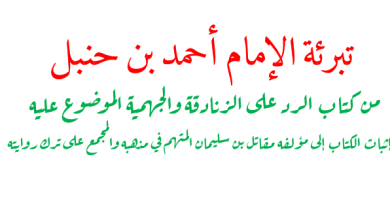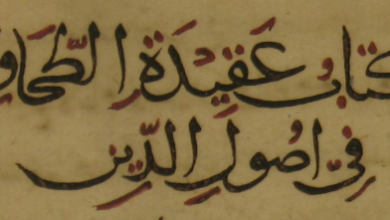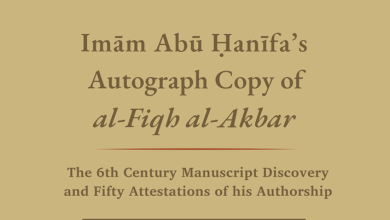Sulṭān al-ʿUmayrī and his Critical View of the Book “Sharḥ al-Sunna” attributed to al-Barbahārī (d. 329 AH)
This article represents the third instalment in our series examining the controversial work “Sharḥ al-Sunna” attributed to the 4th-century Ḥanbalī scholar al-Barbahārī (d. 329 AH). Building upon our previous two articles[i] that explored the historical and textual questions surrounding this text, we now turn to a detailed critical analysis authored by a contemporary Salafi writer known as Sulṭān al-ʿUmayrī.
It is particularly noteworthy that al-ʿUmayrī approached this critique from within the Salafi tradition itself. Unlike other contemporary scholars who have questioned the very attribution of “Sharḥ al-Sunna” to al-Barbahārī—a debate that remains contentious in academic circles—al-ʿUmayrī accepts the work as authentically authored by al-Barbahārī. This acceptance of authorship makes his subsequent critique all the more significant, as it represents an internal Salafi examination of claims made within what many contemporary Salafis consider as a foundational text of ‘Salafi’ creed.
The importance of this analysis lies not only in its scholarly rigour but also in its source: a criticism emerging from within the very tradition that has in recent times venerated this text. Al-ʿUmayrī’s willingness to engage critically with al-Barbahārī’s sweeping claims about his own work—while maintaining respect for the scholar’s overall contribution—demonstrates a nuanced approach to traditional authority that merits careful consideration.
In this article, al-ʿUmayrī systematically examines al-Barbahārī’s extraordinary assertions about his book, including his claim that disagreeing with “even a single letter” of the work would render one a “person of desire” (ṣāḥib hawā) and outside the bounds of orthodox Sunni belief. What follows is a detailed analysis that challenges these claims while attempting to preserve the scholarly dignity of the medieval author.
The main text of al-ʿUmayrī’s critique was uploaded on the following Salafi forum (dated 4-12-13): https://www.kulalsalafiyeen.com/vb/showthread.php?t=48919
Text and translation:
نظرة نقدية في كتاب ” شرح السنة ” للبربهاري … الشيخ سلطان العميري
A Critical View of the Book “Sharḥ al-Sunna” by al-Barbahārī – by Shaykh Sulṭān al-ʿUmayrī
عد كتاب ” شرح السنة ” للإمام البربهاري من أشهر الكتب التي شرحت عقيدة أهل السنة والجماعة , وقد أوعده مؤلفه مسائل هامة , وضمنه قضايا متنوعة مما يدخل فيه عقيدة أهل السنة .
The book “Sharḥ al-Sunna” by Imam al-Barbahārī is considered one of the most famous books that explain the creed [ʿaqīda] of Ahl al-Sunna wa-l-Jamāʿa. Its author included important issues and various topics relating to the creed of Ahl al-Sunna.
إلا أن القارئ للكتاب يجد أن مؤلفه : الإمام البربهاري يصف كتابه بأوصاف كبيرة , ويحذر من مخالفة أي حرف فيه , بل إنه حذر من مجرد التردد أو التوقف , فقد قال مطالبا بلزوم الأخذ بما في كتابه ومحذرا من مخالفة شيء مما فيه :” وجميع ما وصفت لك في هذا الكتاب فهو عن الله تعالى وعن رسوله صلى الله عليه و سلم وعن التابعين وعن القرن الثالث إلى القرن الرابع , فاتق الله يا عبد الله وعليك بالتصديق والتسليم والتفويض والرضى بما في هذا الكتاب ولا تكتم هذا الكتاب أحدا من أهل القبلة فعسى الله أن يرد به حيرانا من حيرته أو صاحب بدعة من بدعته أو ضالا عن ضلالته فينجو به , فاتق الله وعليك بالأمر الأول العتيق , وهو ما وصفت لك في هذا الكتاب , فرحم الله عبدا ورحم والديه قرأ هذا الكتاب وبثه وعمل به ودعا إليه واحتج به , فإنه دين الله ودين رسوله , وأنه من استحل شيئا خلافا لما في هذا الكتاب فإنه ليس يدين الله بدين وقد رده كله” ( شرح السنة 106).
However, readers of the book find that its author, Imam al-Barbahārī, describes his book in grand terms and warns against disagreeing with even a single letter in it. He even warns against mere hesitation or reservation. He said, demanding adherence to what is in his book and warning against disagreeing with anything in it: “All that I have described for you in this book is from Allah the Exalted, from His Messenger (peace be upon him), from the Followers [Tābiʿīn], and from the third generation to the fourth generation. So, fear Allah, O servant of Allah, and you must believe, submit, delegate [tafwīḍ], and be satisfied with what is in this book. Do not conceal this book from anyone of the people of the qibla, for perhaps Allah may use it to bring back one who is confused from his confusion, or an innovator from his innovation, or one who has gone astray from his misguidance, so that he may be saved by it. Fear Allah and adhere to the original, ancient matter, which is what I have described for you in this book. May Allah have mercy upon a servant and his parents who reads this book, spreads it, acts upon it, calls to it, and argues with it, for it is the religion of Allah and the religion of His Messenger. And whoever permits anything contrary to what is in this book, he is not following Allah’s religion and has rejected it all.” (Sharḥ al-Sunna, 106).
ويرى الإمام البربهاري بأن ما ذكره في كتابه يحقق السنة والنجاة من النار , فإنه لم ذكر الفرق الهالكة والفرقة الناجية قال :” فمن أقر بما في هذا الكتاب وآمن به واتخذه إماما ولم يشك في حرف منه ولم يجحد حرفا منه فهو صاحب سنة وجماعة كامل , قد كملت فيه الجماعة , ومن جحد حرفا مما في هذا الكتاب أوشك في حرف منه أو شك فيه أو وقف فهو صاحب هوى” ( شرح السنة 131) .
Imam al-Barbahārī considers that what he mentioned in his book achieves adherence to the Sunna and salvation from the Fire. When he mentioned the perishing sects and the saved sect, he said: “Whoever affirms what is in this book, believes in it, takes it as a guide, does not doubt a single letter of it, and does not deny a single letter of it, is a perfect follower of the Sunna and the community [jamāʿah], the community is complete in him. And whoever denies a letter of what is in this book, or doubts a letter of it, or hesitates concerning it, is a person of desire [hawā].” (Sharḥ al-Sunna, 131).
فهذه النصوص تدل على أن الإمام البربهاري يرى أن ما جمعه في كتابه يحقق السنة ويحقق النجاة يوم القيامة , وأن من خالفه في شيء مما ذكره في كتابه فهو صاحب هوى .
These texts indicate that Imam al-Barbahārī believes that what he has compiled in his book achieves adherence to the Sunna and salvation on the Day of Resurrection, and that whoever disagrees with anything he mentioned in his book is a person of desire [hawā].
وقد أيد الشيخ : صالح الفوزان الإمام البربهاري على تقريراته تلك , فقال معلقا على بعضها :” ما ذكر في هذا الكتاب هو اعتقاد أهل السنة والجماعة , فلم يقل : من لم يعتقد ما قلت وإنما قال : من لم يعتقد ما في هذا الكتاب , وهو أصول مذهب أهل السنة والجماعة , فلا مأخذ عليه في هذا الكلام كما ظنه بعض القراء , لأنه دون في هذا الكتاب أصول أهل السنة والجماعة , فمن أنكر شيئا منها أو أنكرها فهو ضال لا شك ” ( إتحاف القارئ بالتعليقات على شرح السنة 2/238) .
Shaykh Ṣāliḥ al-Fawzān has supported Imam al-Barbahārī in these declarations, saying in his commentary on some of them: “What is mentioned in this book is the belief of Ahl al-Sunna wa-l-Jamāʿa. He did not say: ‘Whoever does not believe what I have said,’ but rather he said: ‘Whoever does not believe what is in this book,’ which is the principles of the doctrine of Ahl al-Sunna wa-l-Jamāʿa. So, there is no criticism of him in this statement as some readers have thought, because he has recorded in this book the principles of Ahl al-Sunna wa-l-Jamāʿa, and whoever denies any of them or denies them all is undoubtedly astray.” (Itḥāf al-Qāriʾ bi-l-Taʿlīqāt ʿalā Sharḥ al-Sunna, 2/238).
ونحن إذا اعتبرنا نصوص الشريعة وتأملنا في واقع كتاب ” شرح السنة ” ندرك أن تلك الأوصاف التي أطلقها البربهاري على كتابه غير صحيحة , لأنه لم يجيء الأمر بإلزام الناس بكل ما يذكر في الكتب والمؤلفات إلا بكتاب الله وصحيح سنة الرسول صلى الله عليه وسلم , وما ذكره المؤلف في كتابه لا يدخل في ذلك ؛ لأنه اشتمل على تقريراته وفهمه .
If we consider the texts of the Sharīʿa and reflect on the reality of the book “Sharḥ al-Sunna,” we realize that these descriptions that al-Barbahārī gave to his book are not correct, because the command to obligate people to follow everything mentioned in books and writings applies only to the Book of Allah and the authentic Sunna of the Messenger (peace be upon him). What the author mentioned in his book does not fall under this category because it includes his own declarations and understanding.
وقد أبدى عدد من المعاصرين تحفظه على ما ذكره المؤلف , ومنهم : محقق الكتاب : خالد الردادي , ومنهم : د/ عبدالرحمن العثيمين , فإنه قال معلقا على المؤلف :” هذا مبالغة مردودة غير مقبولة من المؤلف – عفا الله عنه – , ومثل هذا الكلام لا يقال إلا لكتاب الله عز وجل ,أو الصحيح الثابت من سنة محمد صلى الله عليه سلم , وأما كلام البربهاري فمثل كلام غيره , يأخذ منه ويترك , وما كان ينبغي له – رحمه الله – أن يزكي نفسه إلى هذا القد المرفوض” (طبقات الحنابلة –حاشية- 3/60) .
A number of contemporary scholars have expressed reservations about what the author mentioned, including: the editor of the book, Khālid al-Raddādī, and Dr. ʿAbd al-Raḥmān al-ʿUthaymīn, who commented on the author saying: “This is an unacceptable exaggeration from the author – may Allah pardon him. Such statements should only be said about the Book of Allah, the Mighty and Sublime, or the authentic and established Sunna of Muhammad (peace be upon him). As for the words of al-Barbahārī, they are like the words of others – some can be accepted and some rejected. It was not appropriate for him – may Allah have mercy on him – to elevate himself to this rejected level.” (Ṭabaqāt al-Ḥanābila – footnote – 3/60).
ثم إنا إذا تأملنا في الكتاب ” شرح السنة ” نجده ليس شاملا لكل مسائل الاعتقاد التي يترتب عليها النجاة يوم القيامة , ثم إنه قد اشتمل أيضا على مسائل عديدة تعد من مسائل الاجتهاد الخلافية بين علماء الإسلام , بل إنه ذكر مسائل ليس عليها دليل أصلا .
Moreover, when we reflect on the book “Sharḥ al-Sunna,” we find that it is not comprehensive of all matters of belief upon which salvation on the Day of Resurrection depends. It also includes many issues that are considered matters of juristic disagreement [ijtihād] among the scholars of Islam. In fact, it mentions issues for which there is no evidence at all.
* المسائل الاجتهادية :
Issues of Juristic Disagreement [Masāʾil Ijtihādiyyah]:
ومن المسائل الاجتهادية التي اشتمل عليها كتاب البربهاري :
Among the issues of juristic disagreement that al-Barbahārī’s book contains:
1- أن الجنة التي أدخلها آدم عليه السلام وأخرج منها هي جنة الخلد .
1- That the Garden which Adam (peace be upon him) entered and from which he was expelled is the Garden of Eternity [Jannat al-Khuld].
2- أن الجمعة يصلى بعدها ست ركعات , بفصل بين كل ركتين .
2- That after the Friday prayer [Jumuʿah], six rakʿahs should be prayed, with a separation between each two rakʿahs.
3- حكم قصر الصلاة في السفر .
3- The ruling on shortening prayer during travel.
4- حكم الصيام في السفر .
4- The ruling on fasting during travel.
5- حكم الصلاة في السراويل .
5- The ruling on praying in trousers.
6- حكم النكاح بغير ولي ولا شاهدين .
6- The ruling on marriage without a guardian or witnesses.
7- عدد التكبيرات في صلاة الجنازة .
7- The number of takbīrs in the funeral prayer.
8- سماع الأموات لكلام الأحياء .
8- The hearing of the dead of the speech of the living.
9- حكم إفراد أحد بالصلاة عليه غير الرسول صلى الله عليه وسلم وآله .
9- The ruling on singling out someone for prayers upon them other than the Messenger (peace be upon him) and his family.
فكل هذه المسائل وقع فيها الخلاف بين فقهاء الإسلام وأئمته , وهي مما لا يصح ان يحكم على المخالف فيها بأنه صاحب هوى أو أنه من الهالكين يوم القيامة .
All these issues have been subject to disagreement among the jurists and scholars of Islam, and it is not correct to judge someone who disagrees on these matters as a person of desire [hawā] or as one of those who will perish on the Day of Resurrection.
* المسائل التي ليس عليها دليل أو دليلها ضعيف :
Issues for Which There Is No Evidence or the Evidence Is Weak:
ومن المسائل التي ليس عليها دليل أو أن دليلها ضعيف :
Among the issues for which there is no evidence, or for which the evidence is weak:
1- أن حوض بني الله صالح عليه السلام هو ضرع ناقته , فالحديث الوارد في ذلك حكم عليه عدد من العلماء – كابن الجوزي والذهبي- بالوضع والنكارة .
1- That the basin [ḥawḍ] of the Prophet of Allah, Ṣāliḥ (peace be upon him), is the udder of his she-camel. The tradition reported about this has been judged by a number of scholars – such as Ibn al-Jawzī and al-Dhahabī – as fabricated and objectionable.
2- أن أرواح الكفار في بئر برهوت في حضرموت , وليس فيها حديث مرفوع , وإنما آثار موقوفة , وقد ضعفها عدد من العلماء كابن رجب وغيره , ولم يأخذ بها الإمام أحمد نفسه .
2- That the souls of the disbelievers are in the Well of Barhūt in Ḥaḍramawt. There is no prophetic tradition [ḥadīth marfūʿ] about this, only statements attributed to Companions [āthār mawqūfah]. A number of scholars, such as Ibn Rajab and others, have deemed them weak, and Imam Aḥmad himself did not accept them.
3- أن أول من ينظر إلى الله الأضراء ثم الرجال ثم النساء , وهذا التحديد لا دليل عليه , وممن نص على ذلك الشيخ صالح الفوزان في شرحه (1/317) .
3- That the first to look at Allah will be the blind, then the men, then the women. There is no evidence for this specification, and among those who stated this is Shaykh Ṣāliḥ al-Fawzān in his commentary (1/317).
4- أن كل قطرة تنزل من السماء معها ملك يوصلها إلى مكانها , وليس فيها حديث مرفوع صحيح , وإنما ورد فيها أثار موقوفة .
4- That with every drop that falls from the sky, there is an angel who delivers it to its place. There is no authentic prophetic tradition about this, only statements attributed to Companions.
وقد اشتمل الكتاب على عبارات مجملة غير محررة , وعبارة وقعت فيها المبالغة كمثل قول المؤلف :” واعلم رحمك الله أنه ما كانت زندقة فقط ولا كفر ولا شك ولا بدعة ولا ضلالة ولا حيرة في الدين إلا من الكلام وأهل الكلام والجدال والمراء والخصومة ” ( شرح السنة 92) , ولا شك أن هذه مبالغة , فإن من البين جدا بطلان علم الكلام وخطئه , ولكن ليس من العدل القول بأنه لم يحصل كفر ولا زندقة إلا من طريق علم الكلام أو من طريق أهله , فكثير من الزنادقة والكفرة لم يكونوا من المتكلمين ولا من أتباعهم .
The book also contains general, unrefined expressions and statements in which there is exaggeration, such as the author’s saying: “Know, may Allah have mercy on you, that there has never been heresy [zandaqa], nor disbelief [kufr], nor doubt, nor innovation [bidʿa], nor misguidance, nor confusion in religion except from theological rhetoric [kalām] and the people of theological rhetoric, disputation, argument, and controversy.” (Sharḥ al-Sunna, 92). There is no doubt that this is an exaggeration. While it is very clear that the science of kalām is invalid and erroneous, it is not just to say that no disbelief or heresy has occurred except through the science of kalām or through its adherents, for many heretics and disbelievers were neither theologians [mutakallimūn] nor among their followers.
وبعد هذا العرض يتبين لنا أن تلك العبارات التي أثنى بها الإمام البربهاري على كتابه غير صحيحة , وهي مخالفة لدلالات الكتاب والسنة , ومخالفة لأصول أهل السنة في الاجتهاد في المسائل الفرعية .
After this presentation, it becomes clear to us that those expressions with which Imam al-Barbahārī praised his book are not correct. They contradict the indications of the Qur’an and Sunna, and they contradict the principles of Ahl al-Sunna regarding juristic effort [ijtihād] in subsidiary issues.
فهي مما يجب إنكاره وبيان خطئه , ولكن هذا لا يعني اتهام الإمام البربهاري أو القدح في عمله أو دينه , ولا يبرر لأحد أن يتطاول عليه أو لا يلتزم الأدب معه .
These are matters that must be rejected and their error explained, but this does not mean accusing Imam al-Barbahārī or criticizing his work or religion. Nor does it justify anyone being disrespectful toward him or not maintaining proper etiquette with him.
وإنما غاية ما يدل بيان الخطأ ولزوم إظهار مخالفته لمقتضيات النصوص الشرعية , مع حفظ حقوق الإمام البربهاري ومراعاة مكانته وقدره وجهوده
Rather, the utmost goal is to explain the error and to show its contradiction with the requirements of the religious texts, while preserving the rights of Imam al-Barbahārī and respecting his status, worth, and efforts.
[i] See here under the title: Al-Albānī on the Ḥanbalī: Al-Barbahārī (d. 329 AH) and his extremism in ʿAqīda –
And:
Zubair ʿAlī Zaiʾī (d. 2013) on the Sharḥ al-Sunna ascribed to al-Barbahārī (d. 329 AH) –
Compiled by:
Abul Hasan Hussain Ahmed
11th June 2025/15th Dhu’l Hijja 1446 AH
(www.darultahqiq.com, Updates on Telegram: https://t.me/Darul_Tahqiq)
Download the above as a PDF file – HERE






